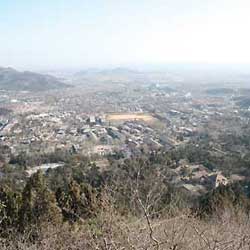
All day long every weekend, an unbroken column of heads moves along the main trail to Xianglu Peak, the highest point in west Beijing's Xiangshan Park (the Fragrant Hills). The heads belong to day hikers who have heard of Xiangshan's wilderness and proximity to downtown. They want to conquer the 557-meter-high peak but don't know how crowded the main trail gets. So many people use the trail that it feels like a subway entrance at rush hour. Occasional hikers yell, push or spit.
Most of the 30,000 to 40,000 people who march for the peak on an average weekend day follow this paved, developed and clearly marked trail. The trail goes from the Xiangshan east gate through the centre of the park past a teahouse, two snack bars and two public toilets. Hikers get submerged in coniferous forests and stop at scenic lookouts from which they can see much of urban Beijing on clear days.
"A lot of people know about Xiangshan, especially in the autumn. Transport getting there is convenient and you can see the mountains up close," said Sun Huijie, leader of the Beijing Hikers club. "I've asked some foreigners. They say they like to go, but they won't go too often because of the crowds."
But last year, Xiangshan Park in the hills of west Beijing opened a more obscure peak-bound trail they think is just as good as the main axis, though longer by as much as an hour. The new route, also paved, winds through the wild south part of the 100-hectare park instead of going through the middle. "We want people to go more to the south side," said Kang Ling, a staff member in the park. "Ninety percent of the red leaves are in that area."
Some adventurous, crowd-shy visitors are taking the new trail, which is named after its halfway point, the Heshun Gate. But so few people use it that hikers can walk alone for stretches and gaze down on crowds using the other trail.
"If people don't come often, when they come they'll use the bigger trail because they don't know better," said Beijing hiker Jian Sujie, who visits the park monthly.
Heshun Gate hikers can start from behind the Fragrant Hill Hotel (Xiangshan Hotel) which is near the park's east gate. They rest in the Liangfeng Pavilion, where the switchbacks start, or beside the barricaded Mountain God Temple, where pines begin to thin in favor of the deciduous trees that drop colored leaves later in the year. Signs along the trail explain the history of the 820-year-old park and identify plants.
From the actual Heshun Gate, which is sealed from the outside, the trail takes hikers upward to panoramic views of the park and part of the city. It connects with the main peak trail a couple hundred meters from the top.
A hiker with one hour can do a densely forested and thinly populated loop from the Xiangshan Hotel to Buddha Rock and Chaoyang Cave via the Liangfeng Pavilion or take a hard left along the hotel driveway along Jingcui Lake to Double Stream Villa, where Mao Zedong worked before his revolution was completed in 1949.
"The best thing is to avoid people," said Tang Chaohui, 36, who sees the crowd thickening as he hikes Xiangshan once a week. "I've found there are quite a few routes to the top now."
Best time to go: Day hikers intent on avoiding crowds can go as early as 6 AM. For a more peaceful trip, weekdays are better than weekends. (Crowds are thickest in April, when trees flower, and in November, when tree leaves turn red.)
Getting there: From the Bajiao Amusement Park subway station, a taxi can take West Fifth Ring Road toward the park gate for 25-30 yuan (US$3.1-3.8). A bus from the Xizhimen subway station to the park takes an hour. There are 4,000 car parking spaces.
Tickets: 10 yuan (US$1.3). At the east gate, park maps sell for 3 yuan (US$0.4). Visitors can watch an introductory video inside the gate.
Meals: Inside the park, the Songlin restaurant and next-door Mengyangyuan Hotel (8259-6762) serve traditional Chinese food. The lobby of Xiangshan Hotel's (86-10-62591166) is a tearoom that adjoins a coffee-shop and restaurants that serve Hangzhou and Sichuan cuisines. Vendors along a road between the east gate and the Xiangshan bus stop sell bottled drinks and dried fruits. Also along the road are three cafes, including a Sculpting in Time branch with a backyard patio, one teahouse and a half dozen diners.
Accommodation: 800 yuan (US$100) per night at Xiangshan Hotel, which requires reservation; 200-400 yuan (US$25-50) per night at Mengyangyuan; 290 yuan (US$36.3) per night at Xiangshan Villas outside the east gate; 1,660 yuan (US$207.5) per night (or more) for luxury rooms at Xiangshan Jinyuan (Golden Resources) Commerce Hotel near the Xiangshan bus stop.
Precautions: The park management asks visitors to avoid dirt trail detours, which damage plants and endanger hikers.
Tel: 86-10-62591155.
(China Daily June 9, 2006)
|

